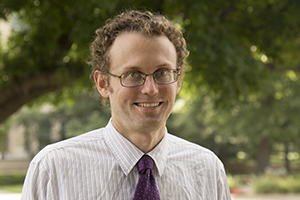
The Forgotten Attribute of God
The new issue of  Credo Magazine focuses on The Aseity of God. The following is an excerpt from Glenn Butner’s feature article, The Forgotten Attribute of God: Why Modern Theology Abandoned Aseity and Why We Must Recover It Today. Glenn Butner, Jr. (M.Div., Duke Divinity School, Ph.D., Marquette University) is assistant professor of theology and Christian ministry at Sterling College in Sterling, KS. His first book, The Son who Learned Obedience: A Theological Case Against the Eternal Submission of the Son was released in 2018.
Credo Magazine focuses on The Aseity of God. The following is an excerpt from Glenn Butner’s feature article, The Forgotten Attribute of God: Why Modern Theology Abandoned Aseity and Why We Must Recover It Today. Glenn Butner, Jr. (M.Div., Duke Divinity School, Ph.D., Marquette University) is assistant professor of theology and Christian ministry at Sterling College in Sterling, KS. His first book, The Son who Learned Obedience: A Theological Case Against the Eternal Submission of the Son was released in 2018.
Aseity refers to God’s independence in his existence, decrees, will, and acts. In other words, God and only God determines who God is, what God does, and what God wills. Consider the definition provided by Louis Berkhof, who writes that God “has the ground of his existence in himself” such that “he is not only independent in himself, but also causes everything to depend on him.”[1] Aseity means that God is the explanation of all things, including himself.
In creation, we might appeal to secondary causes to help explain certain phenomena (for example, as the author I caused this article even as God is also its cause by providence), but in God the only explanation is God. For this reason, some theologians in past derived God’s immutability and impassibility from God’s aseity. A God who explains his own nature and existence will neither change nor suffer, for these would require a created explanation for God’s condition.
Why Have Modern Theologians Rejected Aseity?
Though God’s aseity is a divine attribute with a long pedigree, shortly after Berkhof’s time modern theological treatments of the doctrine of God marginalized or criticized aseity for philosophical, apologetic, and hermeneutical reasons. However, rejecting divine aseity undermines the basis in the doctrine of God for the gratuitousness of creation and salvation, just as it jeopardizes our ultimate freedom from evil. Thus, it is important to defend the classical position.
Granting that each theologian will offer unique specific arguments, it is still possible to outline three broad concerns behind the modern tendency to reject aseity. First, many modern theologians are suspicious of the influence of Greek thought in the historical development of the Christian tradition. Perhaps the most notable figure here is Adolph von Harnack, who worries that Greek influence distorted early Christian beliefs that remain influential today. By the scholastic era, Harnack believes biblical themes and doctrines are subordinated “as component parts of a system to a uniform thought.” In the case of Aquinas, for example, Harnack believes an Aristotelian conception of God’s necessity and aseity becomes a “uniform thought” in Aquinas that subordinates and ultimately silences apostolic emphases.[2]
Those who are concerned about the influence of Greek philosophy more often directly target doctrines like immutability and simplicity, with aseity falling casualty as a logical consequence since it is so closely related to these doctrines. If immutability is rejected, then God does change in response to the world. On this account, God lacks aseity because his acts and will would depend on the events of history.
A second concern behind modern skepticism toward aseity is an apologetic effort to provide a response to the problem of evil. The problem of evil can be expressed in a logical form: why would an all-powerful, all-knowing, all-good God allow evil? However, it can also be expressed as an existential crisis: where is God during this suffering? It is this second version of the problem of evil that Jürgen Moltmann addresses in his widely influential book The Crucified God. Here, Moltmann emphasizes the novel “pathos of God,” God’s emotional response to human history as a result of the covenants. When Moltmann asks where God is during the suffering of Auschwitz, the pathos of God allows Moltmann to answer that God suffers with those who are murdered. “There cannot be any other Christian answer to the question of this torment. To speak here of a God who could not suffer would make God a demon,” Moltmann writes.[3] Of course, a God who suffers is one who lacks aseity, for this God’s emotional existence is dependent on the events of history.
A third concern behind modern skepticism of aseity is found in very different theological circles, where biblicist influences have led some evangelical theologians to affirm a partial divine independence and a partial dependence of God on his creation. For example, John Frame acknowledges the aseity of God and provides extensive scriptural support for the doctrine, arguing, “aseity is essential to a credible doctrine of God.”[4] However, Frame then subsequently affirms that there is a “responsiveness” in God that “evaluates” conditions, leading to his emotions.[5] Here, Frame appeals to many other scriptural passages that depict God feeling emotions. In an effort to be scriptural, Frame affirms that God is independent in some respects, while teaching a divine dependence in others – God’s emotions, evaluations, and responses depend on creation. In much classical theology, divine simplicity would entail that a change in God’s emotions is a change in God’s existence and being, for the emotions, existence, and being of God are the same simple reality.
Read Dr. Glenn Butner’s entire article in the new issue of Credo Magazine: The Aseity of God.
Endnotes
[1] Louis Berkhof, Systematic Theology (Grand Rapids, MI: William B. Eerdmans, 1941), 58.
[2] Adolph von Harnack, History of Dogma, vol. 6 and 7, trans. Neil Buchanan (New York: Dover, 1961), 161, 179.
[3] Jürgen Moltmann, The Crucified God, trans. R. A. Wilson and John Bowden (Minneapolis, MN: Fortress, 1993), 274.
[4] John Frame, Systematic Theology: An Introduction to Christian Belief (Phillipsburg, PA: P & R, 2013), 412.
[5] Ibid., 414.

